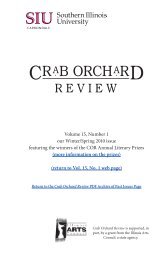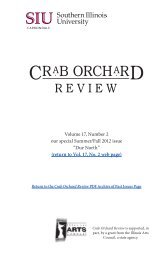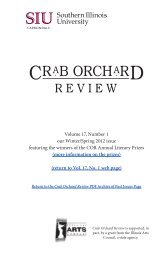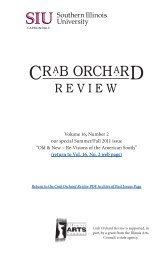Crab Orchard Review Vol. 12, No. 2, our
Crab Orchard Review Vol. 12, No. 2, our
Crab Orchard Review Vol. 12, No. 2, our
Create successful ePaper yourself
Turn your PDF publications into a flip-book with our unique Google optimized e-Paper software.
Book <strong>Review</strong>s<br />
Magee, Kelly. Body Language. Denton, TX: University of <strong>No</strong>rth<br />
Texas Press, 2006. 197 pages. $<strong>12</strong>.95.<br />
Kelly Magee’s Body Language, the 2006 winner of the Katherine Anne<br />
Porter Prize in Short Fiction, contains stories about a wide range of<br />
characters, most of whom are lower-class and marginalized Americans<br />
whose voices go unheard amongst the louder majority voices of society,<br />
and who, for that reason, rely more on their actions than their words to<br />
communicate their deepest feelings.<br />
This theme is most evident in the title story, in which the ten-yearold<br />
protagonist, Lucha, the daughter of Hispanic migrant farm workers,<br />
struggles to fit in at school due to her inability to speak English clearly<br />
and her propensity for hitting her classmates, which she does “because it<br />
is the one language in which she can make herself perfectly understood.”<br />
Indeed, the character’s name (which is a conjugated form of the Spanish<br />
verb luchar, “to fight”) sums this up, almost too neatly. And while such<br />
neatness might make the character seem overly reductive or allegorical<br />
in some authors’ hands, Magee’s rich depiction of Lucha as a young girl<br />
struggling to define her place within her family, her peer group, and<br />
her often-changing communities moves the character beyond mere<br />
symbolism and makes her a living person with whom most readers will<br />
be able to identify and sympathize.<br />
Lucha isn’t the only character in this collection who resorts to<br />
violence as a form of communication. In “All the America You Want,”<br />
a group of Hispanic youths who find themselves and their families<br />
displaced by South Tampa’s urban renewal efforts futilely communicates<br />
their frustration via arson. In “The Business of Souls,” the nine-yearold<br />
narrator, Matt, lives with his sister and his ex-paratrooper father,<br />
who teaches his children to land on their feet—both figuratively and<br />
literally—by regularly requiring them to jump off the roof of their trailer.<br />
Matt survives as one of the smallest members of his class by taking his<br />
sister’s advice: “hit first.” And in “As Human as You Are Standing Here,”<br />
Leo, a pre-operative transgendered male who can’t afford the medical<br />
treatment that will fully transform him into a woman, and Gypsy, a<br />
218 ◆ <strong>Crab</strong> <strong>Orchard</strong> <strong>Review</strong>






